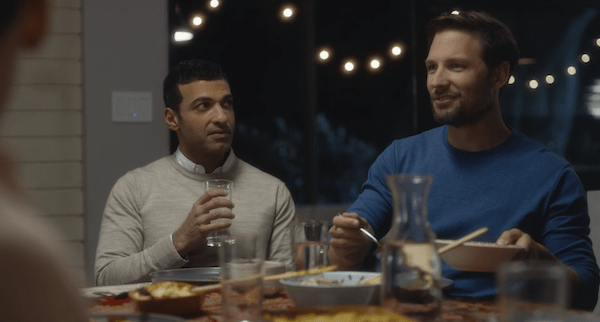Film Review: “Breaking Fast”– The Romantic Life, Among Gay Muslims
By Sarah Osman
Films like Breaking Fast introduce audiences to cultures that they may not be familiar with — that they may even be hostile to — but through conflicts and dreams that are universal, that revolve around family, love, and friendship.
Breaking Fast directed by Mike Mosallam. Streaming on Apple TV and elsewhere.

Haaz Sleiman and Michael Cassidy in a scene from Breaking Fast.
It’s no secret that film and TV still remains a largely white business. Despite continual calls for more diversity and lots of empty promises from the showbiz powers-that-be about representation, there remains a severe lack of stories centered around people of color.
Refreshingly, the indie romantic comedy Breaking Fast features two underrepresented groups — MENA (Middle Eastern North Africans) and the LGBTQ+ community — in an earnestly heartfelt story. Breaking Fast is an expanded version of director Mike Mossalam’s 2015 short, which was an examination of how religion and sexuality intertwine.
Lebanese doctor Mo (short for Mohammed; Haaz Sleiman) is a devout Muslim living in West Hollywood. Mo’s family accepts that he is gay, especially his mother; Mo yearns for his boyfriend, Hassan, to come out to his. Hassan decides that he cannot bear his family’s rejection (they are not accepting) and he ends up marrying a woman. A year goes by, and it’s the holy month of Ramadan. Mo is struggling to get over his ex with the help of his friend Sam (Amin El Gamal), who is also Arab and gay. Sam insists that Mo come to his birthday party where he meets Kal (Michael Cassidy), an American who is not only very respectful of Islam but speaks Arabic (he lived in Jordan for part of his childhood).
Mo and Kal’s burgeoning relationship is endearing. Kal joins Mo for Iftar (the meal at the end of every night that breaks the fast) and surprises him by preparing Lebanese dishes. Because impure thoughts are a no-no during Ramadan, Mo and Kal get to know each other without sex. At times, their relationship becomes somewhat bland, though there is an enjoyably cheesy montage of the two going to the grocery store and cooking together. It’s rare to see gay relationships in film that aren’t melodramatic, often haunted by some sort of inner trauma, so the depiction of a sweet, happy relationship between two men is satisfying. Let’s face it, there are already far too many rom-com montages of straight people wandering around New York City discussing their feelings. Let get some picturesque hand-holding featuring LBTQIA+ folks.
Mo is the more intriguing partner. His relationship with Islam is unusual because it is so normal. He’s proud to be Muslim and gay. He points out that nowhere in the Quran is it deemed that one should be punished for being gay. His God loves him no matter what. Kal, on the other hand, has to deal with a varied collection of family members, some of whom resent Mo’s positive outlook on life. The strongest scene in Breaking Fast is Kal’s showdown with Mo about the latter’s determination to always be positive. Mo explains that his faith makes him optimistic. Frankly, it is a little too convenient that Kal already speaks Arabic and is familiar with Arab culture. Even though Kal is white, the two men aren’t from different, clashing cultures. That would have made the film far more dramatically compelling. Also too good to be true: Kal rarely questions Mo’s beliefs or presents him with any major relationship problems. He’s almost perfect — but this is a common trope in rom-coms, not just here.
The most interesting character in the film is Sam. He’s proud to be gay and loves his life. While he was raised Muslim, he does not practice. He refuses to absolve Islam of its prejudices: he condemns Arab countries that mistreat the LGBTQ+ community as well as his own family’s homophobic views. Sam and Mo’s argument over how religion should shape one’s life is an important debate, one that enlivens this rom-com in powerful ways. I would love to see a spin-off film that focuses solely on Sam as he navigates his cultural background and makes personal choices.
Major studios are rarely making rom-coms these days, leaving this venerable genre to indie films and streaming services. While they operate with relatively small budgets, these new romantic comedies — when they are diverse — use empathy as a way to strengthen calls for representation. Films like Breaking Fast introduce audiences to cultures that they may not be familiar with — that they may even be hostile to — but through conflicts and dreams that are universal, that revolve around family, love, and friendship.
Breaking Fast may not be the next When Harry Met Sally, but it’s still darn cute and even includes a cliché big romantic moment. Nice to know that rom-coms can still gratify.
Sarah Mina Osman is a writer living in Los Angeles. She has written for Young Hollywood and High Voltage Magazine. She will be featured in the upcoming anthology Fury: Women’s Lived Experiences under the Trump Era.
